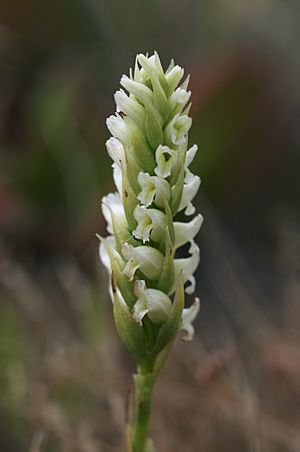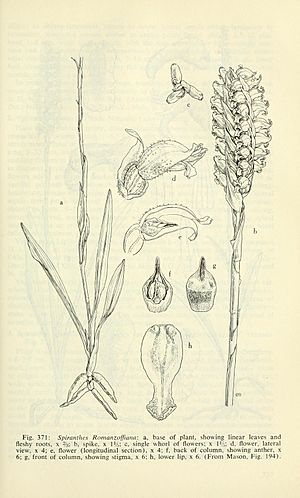Hooded lady's tresses facts for kids
Quick facts for kids Hooded lady's tresses |
|
|---|---|
 |
|
| Scientific classification | |
| Genus: |
Spiranthes
|
| Species: |
romanzoffiana
|
| Synonyms | |
|
|
The Spiranthes romanzoffiana, often called hooded lady's tresses or Irish lady's-tresses, is a type of orchid. This plant gets its name from Count Nikolay Rumyantsev. He helped pay for a trip where the plant was first found.
This special orchid grows naturally in North America, Ireland, and the British Isles. It was first described in 1828.
Contents
What is Hooded Lady's Tresses?
Hooded lady's tresses is a plant that lives for many years. It has thick, fleshy roots. New shoots grow from these roots. The plant has long, narrow leaves.
Its flowers grow in three rows. These rows twist around the stem like a spiral. Each flower has a sweet smell. The sepals and petals of the flower join together. They form a tube-like shape. The lower petal, called the labellum, is white. It has green lines on it.
How the Plant Reproduces
This orchid blooms in late summer. Insects help to pollinate its flowers. The plant's seeds are very tiny, like dust. The wind carries these seeds to new places.
The plant can also grow new shoots from its roots. This means new plants can grow even if the old plant parts die. This orchid also works with a special fungus. This fungus helps the orchid get important nutrients from the soil.
Where Hooded Lady's Tresses Lives
The German botanist Adelbert von Chamisso first described this orchid. He found it during a science trip to the Americas between 1815 and 1818. He named it after Count Nikolay Rumyantsev, who funded his journey.
This orchid is common in North America. This includes Canada and the United States. But it also grows in a few places in Scotland, England, and Ireland. The first time it was recorded in Ireland was in 1810. This was in County Cork. Since then, it has been found in other parts of Ireland. These places include the Lough Neagh area and the Mourne Mountains.
Plant Habitat
Hooded lady's tresses likes to grow in wet areas. You can often find it along the edges of lakes. It also grows in damp fields where grass grows.
It's a bit of a mystery why this plant grows on both sides of the Atlantic Ocean. Scientists are still trying to understand this unusual pattern.
See also
 In Spanish: Trenzas de damas moñuda para niños
In Spanish: Trenzas de damas moñuda para niños


